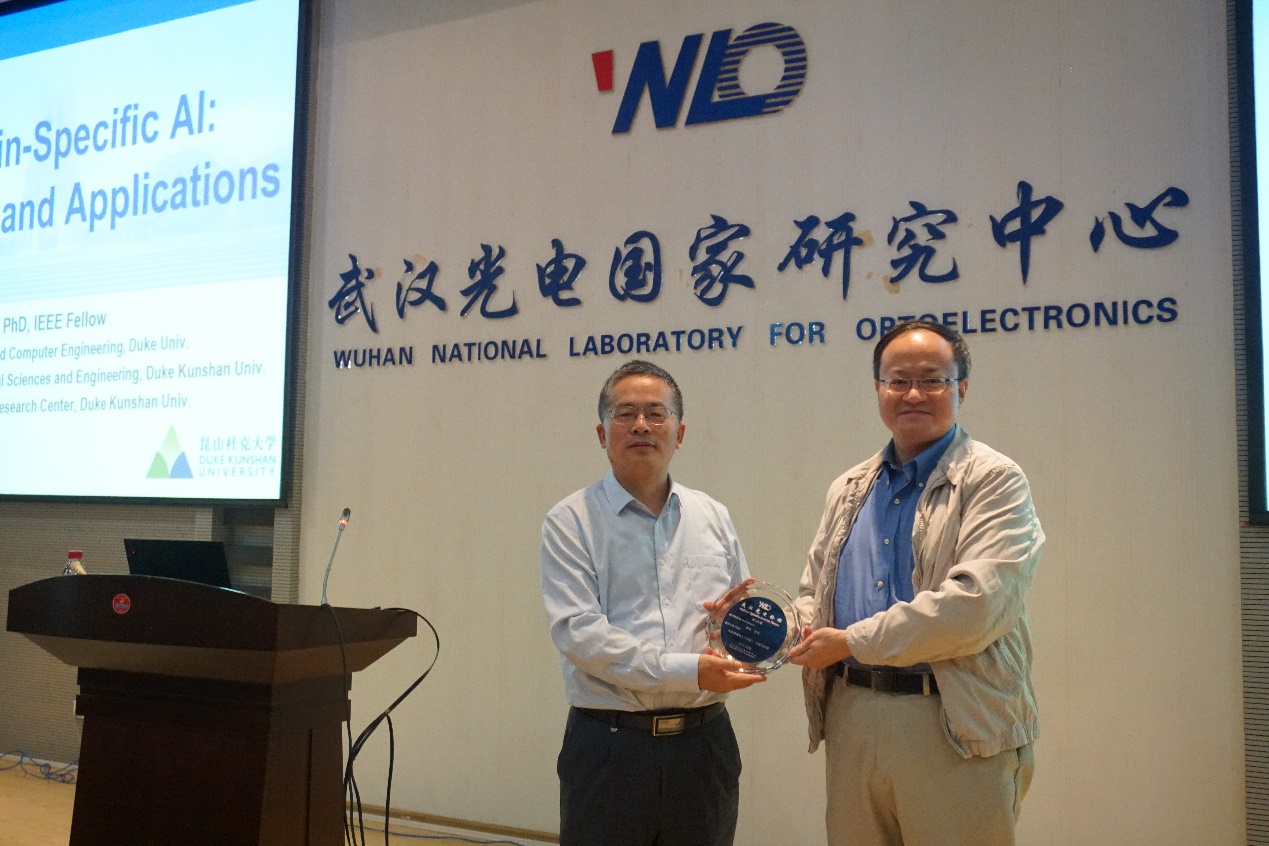WUHAN, China (September 23, 2020) - Wuhan Optoelectronics Forum No. 168 was successfully held in Auditorium A101 at Wuhan National Laboratory for Optoelectronics (WNLO) in the morning of September 23. Professor Xin Li from Duke University delivered an exciting presentation entitled ‘Domain-Specific AI: Practices and Applications’. Professor Wei Xiong, from WNLO chaired the forum. Professor Lu Peixiang, Deputy Director of Wuhan National Laboratory for Optoelectronics (WNLO), awarded the forum medal to Professor Xin Li.

Professor Li Xin pointed out that the current development of artificial intelligence is not focused on algorithms, but more driven by big data. The difficulty of its development lies in combining with the actual application scenarios of various industries and turning the pain points and difficulties in the industry into specific problems that can be solved by artificial intelligence algorithms. Through the successful application of artificial intelligence in semiconductor device manufacturing, magnetoencephalography, intelligent driving, marketing, pre-school education and construction industries, the application concepts of artificial intelligence in the interdisciplinary fields are introduced in a simple way.

In the semiconductor device manufacturing industry, machine learning algorithms are applied to the defect detection of integrated circuits, reducing the detection time to 1/100 of the traditional detection methods; using artificial intelligence to diagnose and adjust the performance of wafer transistors, greatly Improve the product output during large-scale process transfer. The artificial intelligence method is applied to the extraction of electromagnetic signals from the human brain to reduce the noise of the strong magnetic field on the surface, and realize the real-time control of the mechanical arm by the human brain. The application of intelligent floodlight system to automatic driving improves the safety of the traffic environment.
After Professor Li Xin finished speaking, he had an enthusiastic academic exchange with the teachers and students, and answered the following questions:
1.In the current artificial intelligence applications, machine learning is still used instead of deep learning, mainly because deep learning requires a large amount of data. But the amount of data generated in a short period of time is not large in many cases, or the data set will have large changes over time, resulting in poor model applicability. Professor Li Xin explained the positive (image, video and voice) and reverse (wafer transistor diagnosis) examples of deep learning applications.
2.While applying artificial intelligence to the real-time monitoring of semiconductor devices, it is necessary to consider whether to achieve full automation or semi-automation with manual participation. This involves transfer learning to the old data set and Bayesian optimization of the old model.
3.Regarding the impact of the development of artificial intelligence on human society’s legislation and jobs, Professor Li Xin pointed out that the development of artificial intelligence will still improve the quality of human life on a people-oriented basis. Related legislative work will also focus on people, and the development of artificial intelligence will also reflect higher technological content in jobs.
4.The application of artificial intelligence algorithms to the 5G and 6G communications fields makes the algorithms fast enough and the hardware cost low enough, thereby reducing costs and improving market competitiveness.
Finally, Professor Li Xin said that the development of artificial intelligence requires the training of cross-field talents and the cooperation of multi-field expert teams, which needs to be developed in more application scenarios.